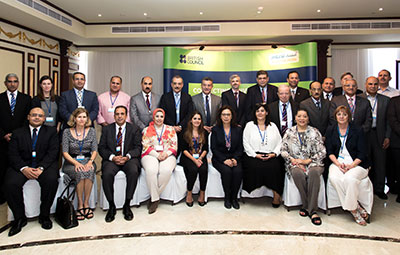

News
Egyptian university presidents consider more outreach

Luxor, 16 November 2014 – At a two-day conference called “Connecting Universities,” co-sponsored by the British Council and Al-Fanar Media with support from the Ford Foundation, presidents of Egypt’s public higher learning institutions discussed ways to strengthen domestic university ties, enhance student connections and connect Egyptian universities with employers. This was a timely topic given that many presidents had just finished managing protests as their campuses opened for the academic year 2014/2015. The participants also discussed ways to link universities and students overseas through internationalization.
In just one example of a program used to increase dialogue and ease tension, the acting president of Alexandria University, Roshdy Zahran, said administrators created a student union for dormitories and a council comprised of students, staff and faculty in response to unrest in dorms that billowed after Egypt’s 2011 uprising. “They were accusing us of eating their food and stealing their money,” he said. The council and union have existed for three years, Zahran said, and “so far it has been working wonderfully.”
But much of the conference was aimed at looking outward. Mohamed Loutfi, pro vice-chancellor for international at Cardiff Metropolitan University, in Wales, spoke about strategic approaches to international higher education. “When universities take on internationalization, each university should identify what the concept means for its institution, what it does for its students and if the institution can achieve those goals”, he said. Internationalization is an integral part of access and quality, he said, and is about creating opportunities to help make students more employable.
An international perspective is central to a contemporary university education no matter what country students are from, said Arlene Jackson, director of international education at the American Association of State Colleges and Universities. “As we heard from Prof. Loutfi, the fabric around which a campus must focus to become more international requires a framework, resources and strong leaders like yourselves,” she said, meaning the Egyptian presidents. “You definitely are leaders who are agents of change, particularly at this time in Egypt’s history.”
University leaders and event speakers considered another way to link to communities: Reaching out to businesses, which could help students secure employment. Deborah Pownall, employer and alumni engagement manager at Liverpool John Moores University, offered strategies for those connections. “We start by making a very clear, concise offer to help the employers access the university,” said Pownall. Liverpool John Moores has a 93.7 percent employment rate among its graduates. Every degree at the university has a work-related component built into it, she said, and interested students can get a “world of work” skills certificate. Students who want to get that certificate have to go through a series of career-related steps culminating in an employer interview.
“Why not develop a national campaign about learning in Egypt?” asked Lisa Anderson, president of the American University in Cairo at the conference closing session. “Egyptian universities themselves should be better at networking,” said Anderson, who proposed that universities in Egypt collaborate to offer in-country study abroad programs, to connect with prospective student employers and to share best practices in career services, student development and technology transfer. “This country has unparalleled natural human resources in higher education and research and it’s now time to make that visible and accessible to the world,” she added.
